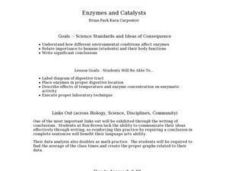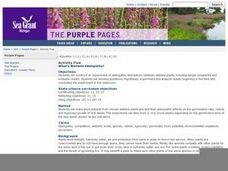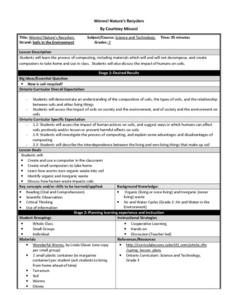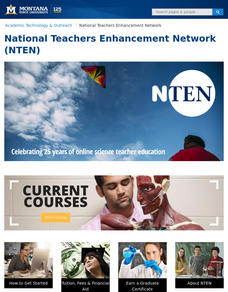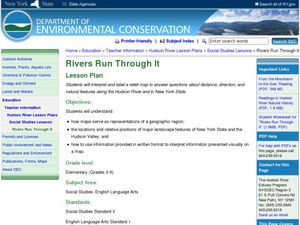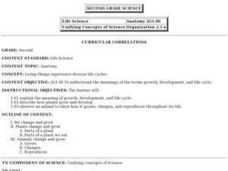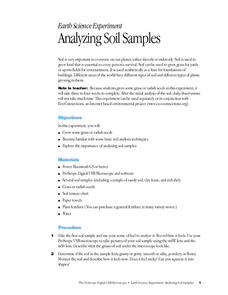Oregon Museum of Science and Industry (OMSI)
DNA Extraction
What does your DNA actually look like? Use simple materials with this experiment to find out! Geneticists of all ages can follow these instructions to extract their own DNA. For learners who are hoping to extend the activity, there are...
Curated OER
Designing an Ecologically Sound City
Fifth graders design an "ecologically sound" city. They write laws for the city to help make all citizens aware of their ecological responsibilities and propose alternative power sources for light and heat.
Carnegie Mellon University
Bathtub Model
Using a colorful infographic handout and a guide sheet, hold a class discussion about how a bathtub can serve as a model for the greenhouse effect created by Earth's atmosphere. Participants will understand that as energy or matter is...
Curated OER
Ideas for Resources: Geology Lab Manual
The link to Ideas for Resources: Geology Manual is no longer valid, but the link to How to Teach Using Role-Playing does. Choose a realistic problem related to your focus topic, assign roles, and send your geology learners off to...
Curated OER
Soil Investigations
Students examine the basics about soil. In this soil lesson students describe the physical properties of soil and explain what soil profile is.
Curated OER
The Great Pond Safari
Students study pond life by visiting a pond and completing an associated worksheet. They play an online game based on the pond learning experience.
Curated OER
Enzymes and Catalysts
Students discuss the functioning of the digestive system and the specific enzymes present. They observe the action of amylase on starch to identify characteristics of enzymes then perform an experiment on the effects of temperature on...
Curated OER
The Earth is a Changin'
Students view examples of different types of erosion. In this erosion lesson, students discuss the different types of erosion and how erosion changes Earth. Students explore erosion and the effect it has on engineering.
Curated OER
Toward a Sustainable Agriculture
Your class considers a case study of a sustainable agro-ecosystem and view a PowerPoint presentation about a sustainable farm. They complete a case study worksheet. Extension activities are included.
Curated OER
Recycling Survey
How many people really recycle recyclables and how do they feel about it? High schoolers create a survey to find out. Once they agree on what questions to include, they each interview four people outside of the classroom....
Curated OER
A Tale of Two Wetlands
Students observe 2 separate wetlands (following downloadable worksheets) and record 10 similarities and 10 differences between them. Then they present their recommendations to the class who roleplay the government's wetland conservation...
Curated OER
What's Wetland Allelopathy?
Students study plants and what they need to thrive and survive. They make plant extracts from chosen wetland plants and test their allelopathic effects on the germination rate, radicle growth, and hypocotyl growth of test seeds of other...
Curated OER
Worms, Nature's Recyclers!
Learners study what worms need to survive in different environments. They study how worm composting improves soil and reduce waste. They discuss composting techniques and present a puppet show about a worm's life.
Curated OER
Should Soil Be Sterile?
Students determine if the sterilization of topsoil is beneficial to seed germination and plant growth. They grow plants alongside control groups, make and record observations of plant growth and measure plant biomass.
Curated OER
Fossil Fuels: Facing the Issues
Students explore energy by researching fuel usage on Earth. In this fossil fuel lesson, students define fossil fuels, the energy created by burning them, and the impact on the environment when using them. Students conduct pollution...
Curated OER
Green Buildings Virtual Tour
Students fill out a worksheet after researching green buildings by taking a virtual tour. In this green buildings lesson plan, students use Google Earth to research green buildings.
Curated OER
River Run Through It
With vocabulary lists, worksheets, and more, this lesson sets learners on an exploration of the Hudson River area. They read an essay about the area, analyze a relief map of New York State, and complete a worksheet.
Curated OER
What is the Rock Cycle and Its Processes?
Geology beginners examine three different rock samples and determine their origin by their characteristics. By making and recording observations, they become familiar with features of igneous, metamorphic, and sedimentary rock types....
Curated OER
Living Things Experience Diverse Life Cycles
Second graders will study and explain the meaning of growth, development, and life cycle. They describe how plants grow and develop and observe an animal to show how it grows, changes, and reproduces throughout its life.
Curated OER
Soil: Food Mapping
Students examine the concept of food mapping . In this agriculture instructional activity, students explore food and agriculture systems in the United States in the past and today. Students complete food mapping activities.
Curated OER
Oil Well That Ends Well
Focusing on the effect of oil spills on the environment, learners conduct experiments to explore this issue. First, they create an ocean environment using materials provided. Then, they make a simulated crude oil substance from vegetable...
Curated OER
Urban Ecosystems 4: Metabolism of Urban Ecosystems
Cities are compared to living, breathing, metabolizing organisms. Fourth in a five-part series of lessons, this one focuses on the flow of materials through a city. Links to interesting websites and images make your delivery of...
Curated OER
Analyzing Soil Samples
Students grow grass or radish seeds in this experiment, which takes three to four weeks to complete. They become familiar with basic soil analysis techniques, as well as, explore the importance of analyzing soil samples.
Curated OER
Recycling-Taking it Easy on the Environment
Students review the garbage/landfill graphs included with the activity. They discuss the information on the graphs and discuss which garbage products come from their homes. Students collect examples of over packaging to share with class...








